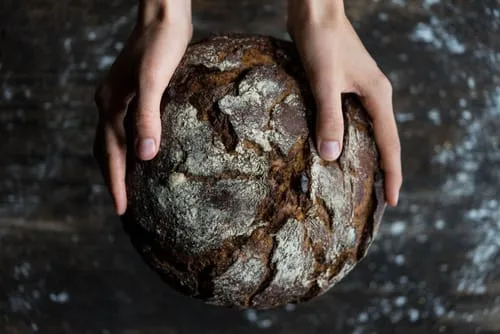Why is Gluten So Bad for Us
By Michael Sharp | February 14th, 2018

I recently had a client say to me, “My family thinks going gluten free is just a fad and they don’t get why I’m doing it if I’m not celiac”. The truth is, gluten free is not just some fad, it’s something we should all be considering in some way or another. A lot of people I talk to don’t really understand why gluten is so bad, let’s talk about it!
The Truth Behind Gluten!
Humans have been exposed to gluten for thousands and thousands of years. This is likely to have started with the consumption of wheat, possibly dating back to around 8000 years ago.
Glutenous foods like wheat, rye, kamut, and barley for example have been staples in the diets of humans for a long time and acted as an affordable food source for families. When this was occurring thousands of years ago, the exposure to gluten wouldn’t have brought about the same issues as it does for our bodies nowadays as these grains were grown organically, they were not hybridized and genetically modified as they are now, and the humans back they were not exposed to the stressors we are now such as poor quality foods, chemicals by air pollution, cosmetics, and food additives, electromagnetic frequencies from all of the electronic devices we have in our faces every minute, and our day to day stress of the busy societies we live inhabit. Simply put, glutens wrath would have been much less on humans living thousands of years ago because their bodies were healthier and better able to deal with dietary stressors.
Regardless of this, no matter what time period gluten was consumed, it would have still lead to damage through out the body.
How is Gluten So Damaging?
Gluten contains a type of protein called gliadin. Gliadin is one of the main reasons for glutens nasty effects. It can make little microscopic holes in our digestive lining, which could lead to something a lot of you may have heard about before, leaky gut. When the digestive lining becomes leaky, undigested foods can escape through these holes, gaining access to the blood stream and therefore the rest of your body. The immune system becomes excited and could start to mistake your own tissues (like the tissue in your joints, skin, and thyroid) for this protein as they can look very similar to these tissues. This can lead to a whole cascade of symptoms that can be very unpleasant!
What Has Gluten and What Doesn’t?
There are a variety of foods that contain gluten that you would want to avoid if approaching a gluten free diet, some of these include:
- Wheat
- Kamut
- Rye
- Barley
- Spelt
- Bulgur
- Farro
Be cautious when simply following the above list for what contains gluten as there are also many store-bought food items that have gluten added to them very sneakily like beer, breads, cereals, broths, sauces and seasonings, imitation bacon and imitation seafood, chocolates and candies, and more! Make sure to do your research before buying gluten free so you may know exactly where it is hiding.
Some of you may be thinking, “Well if I go gluten free, what can I eat?”. Well, there happens to be a variety of grains and foods that are naturally gluten free, some of which are:
- Buckwheat (not actually wheat)
- Millet
- Rice
- Oats (often cross contaminated with wheat)
- Quinoa
- Popcorn
- Amaranth
- Sorghum
- Teff
Always keep in mind that certain foods in their natural state such as fresh fruit and vegetables, nuts and seeds, meat, poultry, and seafood are almost always guaranteed to be gluten free unless is has been added or cross contaminated in some way.
So, give gluten free a try if you feel like it is right for you and your body, especially if your experiencing digestive issues like gas, bloating, acid reflux, and irregular or poorly formed stools, you’ll be quite surprised how good it makes you feel!
___
To share your thoughts about this blog post, visit my Facebook page at facebook.com/holisticlivingnutrition, I would love to hear from you!
Also, visit my Instagram page @holisticlivingnutrition
Keep on living holistic,
Michael Sharp, CNP, NNCP.
DISCLAIMER: The information listed above is for educational purposes and discussion of general health information only. The information, opinions, ideas, and suggestions listed above are in no way intended to diagnose disease/health issues or act as a treatment for disease/health issues and is not to act as a substitute for medical advice from your doctor. Before taking part in any natural or alternative approach to health, these approaches should be reviewed by your doctor for approval especially if there are existing health conditions and if prescribed and or pharmaceutical medication is being taken due to the potential for interactions between medications and any natural approaches to health.
